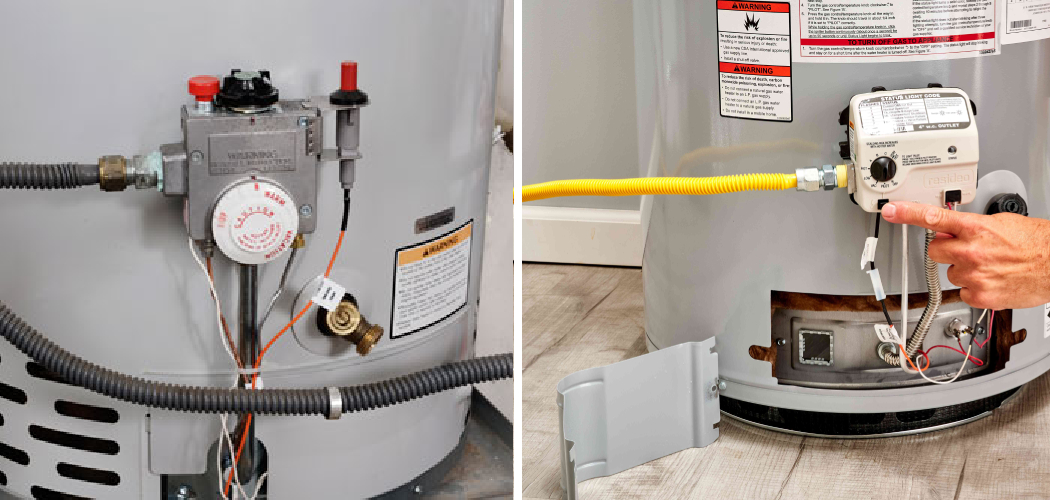Gas hot water heaters are essential appliances in many households, providing a reliable and efficient source of hot water. However, like any other appliance, they can encounter problems from time to time. In this guide on how to troubleshoot gas hot water heater, we will discuss some common gas hot water heater problems and how to troubleshoot them.
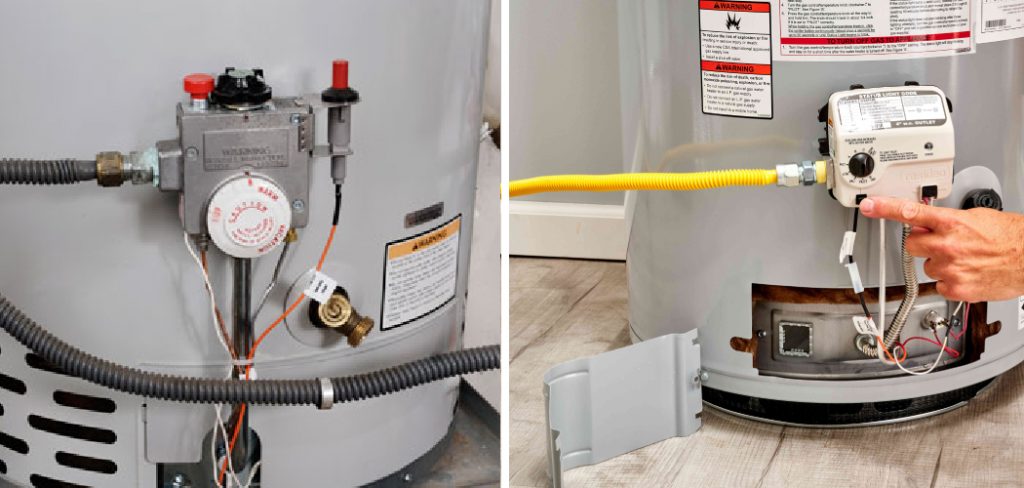
Necessary Items
Before you begin troubleshooting your gas hot water heater, it is important to gather some necessary items:
- Protective gear (gloves, safety glasses)
- Owner’s manual for the specific model of your hot water heater
- Towels or rags to clean up any spills
- A flashlight or work light
- A gas leak detector solution or a mixture of soap and water
- A multimeter (if you have electrical components in your hot water heater)
12 Steps on How to Troubleshoot Gas Hot Water Heater
Step 1: Check the Power Source
The first step in troubleshooting a gas hot water heater is to ensure that it has power. This may seem obvious, but it’s always best to rule out the simplest solution first. Check that the power supply is turned on and that your hot water heater is properly plugged in.
Step 2: Inspect the Pilot Light
If your gas hot water heater has a pilot light, check to see if it is lit. If not, follow the instructions in your owner’s manual on how to relight it. If the pilot light keeps going out or won’t stay lit, this could indicate a problem with the gas supply or thermocouple.
Step 3: Check for Gas Leaks
If you smell gas near your hot water heater, do not attempt to troubleshoot it. Instead, evacuate the area immediately and call your gas provider for assistance. If you have a gas leak detector solution or a mixture of soap and water, you can use that to check for any leaks around the fittings and connections.
Step 4: Inspect the Burner
If the pilot light is lit but the burner isn’t igniting, you may have a problem with the burner itself. Inspect it for any debris or buildup that could be blocking the gas flow. Use a wire brush to clean off any dirt or grime.
Step 5: Check the Thermostat
If your hot water heater is not producing enough hot water, it could be due to a faulty thermostat. Use a multimeter to test the thermostat for continuity. If there is no continuity, it may need to be replaced.
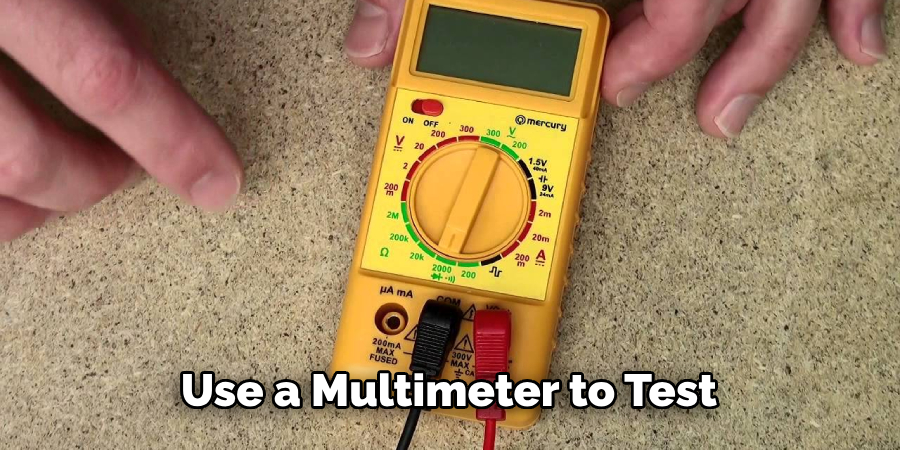
Step 6: Flush the Tank
Over time, sediment can build up in the bottom of your hot water heater tank, reducing its efficiency and potentially causing problems. To flush the tank, turn off the gas supply and cold water supply, then attach a hose to the drain valve and drain out any sediment.
Step 7: Inspect the Anode Rod
The anode rod in your hot water heater is designed to attract corrosive elements and protect the tank from rusting. However, over time, it can become worn and need to be replaced. Check the condition of your anode rod and replace it if necessary.
Step 8: Test the Gas Control Valve
If your hot water heater is not producing any hot water, the problem could lie with a faulty gas control valve. Use a multimeter to test for continuity and replace the valve if needed. If you are not comfortable working with gas, it is best to call a professional.
Step 9: Replace the Thermocouple
The thermocouple is responsible for sensing when the pilot light is lit and allowing gas to flow to the burner. If your hot water heater has a constantly extinguishing pilot light, this could indicate a faulty thermocouple that needs to be replaced.
Step 10: Check the Pressure Relief Valve
The pressure relief valve is an important safety feature in a hot water heater, and it should be checked regularly to ensure it is functioning properly. If you notice any leaks or signs of corrosion, replace the valve immediately.
Step 11: Inspect the Flue Pipe
The flue pipe carries exhaust gases out of your hot water heater and should be checked for any obstructions or damage. Make sure the flue is properly connected and clear of any debris. Like with any gas appliance, proper ventilation is crucial for safety.
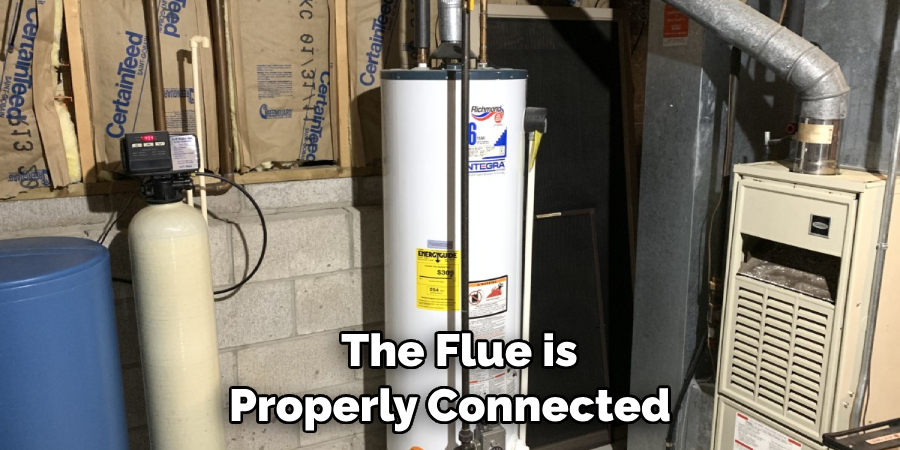
Step 12: Call a Professional
If you have followed all of these steps and are still experiencing problems with your gas hot water heater, it may be time to call a professional. They will have the knowledge and experience to diagnose and fix any issues with your hot water heater safely and effectively.
With the proper knowledge and equipment, troubleshooting your gas hot water heater can be a straightforward process. However, it is always important to prioritize safety and call a professional if you are unsure or uncomfortable with any steps in the process.
Regular maintenance and inspections can also help prevent potential problems with your hot water heater, ensuring it continues to provide reliable hot water for years to come.
9 Safety Measures When Troubleshooting Gas Hot Water Heater
1) Always Wear Protective Gear
When working with gas appliances, it is important to protect yourself from potential hazards. Wear gloves and safety glasses to prevent any injuries. And if you are using a gas leak detector solution, make sure to follow its instructions carefully.
2) Read the Owner’s Manual
Each hot water heater model may have different troubleshooting steps and safety precautions. Be sure to read and understand the instructions provided in the owner’s manual before beginning any troubleshooting.
3) Turn Off the Gas Supply
Before doing any work on your hot water heater, always turn off the gas supply to prevent any accidents. This can usually be done with a simple shut-off valve near the hot water heater. So, make sure to locate it beforehand.
4) Allow the Hot Water Heater to Cool Down
If you have been using hot water recently, allow your hot water heater some time to cool down before starting any troubleshooting. This will prevent any potential burns from hot parts or components.
5) Keep Flammable Materials Away
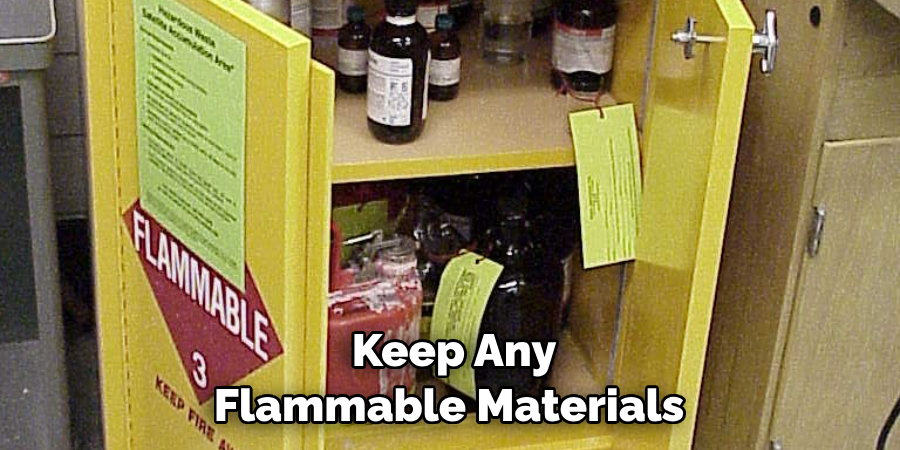
When working with gas appliances, it is crucial to keep any flammable materials, such as paper or chemicals, away from the hot water heater and its surroundings. This will help prevent any potential fires.
6) Inspect for Leaks
Before turning on the gas supply, inspect all fittings and connections carefully for any leaks. If you notice a leak or smell gas near your hot water heater, do not attempt to troubleshoot it yourself. Instead, evacuate the area and call for professional assistance.
7) Have a Fire Extinguisher Nearby
In case of any accidents or fires, it is always a good idea to have a fire extinguisher nearby when working with gas appliances. Make sure the extinguisher is properly charged and in an easily accessible location.
8) Test for Ventilation
Ensure that your hot water heater’s ventilation system is functioning properly before turning on the gas supply. Proper ventilation is crucial for safety when using a gas appliance. Then, check the flue for any blockages or damage.
9) Take Precautions with Pilot Lights
If your hot water heater has a pilot light, make sure to follow the manufacturer’s instructions carefully when relighting it. If you smell gas while attempting to light the pilot, do not continue and call for professional assistance.
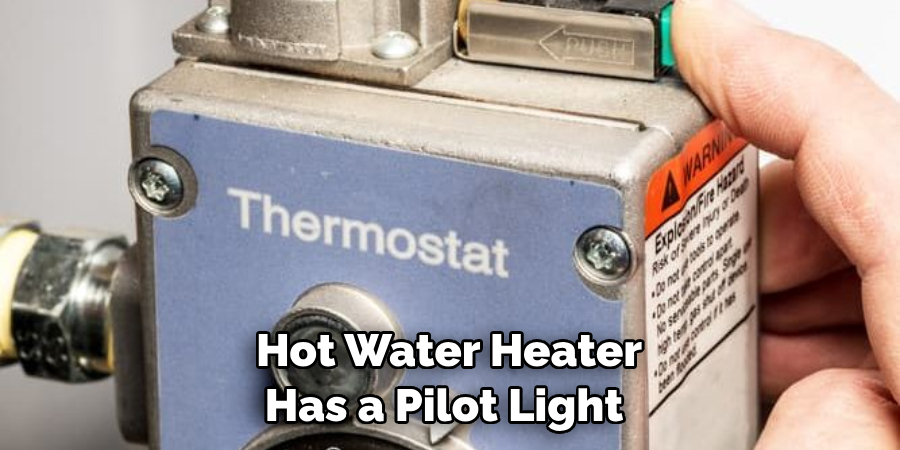
By following these safety measures on how to troubleshoot gas hot water heater, you can troubleshoot your gas hot water heater safely and effectively.
Remember to prioritize safety, and do not hesitate to call for professional assistance if needed. Maintaining your hot water heater regularly can also help prevent potential problems and ensure it continues to provide reliable hot water for your household.
8 Things to Avoid When Troubleshooting Gas Hot Water Heater
1) Using Tools Incorrectly
It is important to use the correct tools and techniques when troubleshooting your hot water heater. Using the wrong tools or using them incorrectly can cause damage to your hot water heater and potentially lead to safety hazards.
2) Neglecting Regular Maintenance
Regular maintenance, such as flushing the tank and checking for leaks, can help prevent potential problems with your hot water heater. Neglecting these tasks can lead to more significant issues down the line.
3) Ignoring Warning Signs
If you notice any warning signs, such as strange noises or a decrease in hot water supply, do not ignore them. These could indicate underlying issues with your hot water heater that need to be addressed.
4) Attempting Repairs Beyond Your Skill Level
Some troubleshooting steps may require technical knowledge and expertise. If you are unsure or uncomfortable with any steps, it is best to call a professional rather than attempt to do the repairs yourself.
5) Using Matches or Lighters Instead of Igniter Button

When relighting the pilot light, it is important to use the igniter button provided by the manufacturer. Using matches or lighters can be dangerous and potentially cause a gas explosion. But if the igniter is not working, it is best to call for professional assistance.
6) Overlooking Safety Precautions
Safety measures are in place for a reason when handling gas appliances. Do not overlook or skip any safety precautions when troubleshooting your hot water heater to avoid potential accidents and injuries.
7) Not Checking Gas Supply
Before attempting any repairs, make sure the gas supply to your hot water heater is turned off. Not checking this can lead to potential gas leaks or fires.
8) Neglecting Professional Inspections
While you can troubleshoot and maintain your hot water heater yourself, it is still important to have a professional inspection done annually. This will ensure that your hot water heater is functioning properly and catch any potential issues before they become bigger problems.
By avoiding these common mistakes, you can effectively troubleshoot your gas hot water heater and ensure its safe and reliable operation. Remember to always prioritize safety and seek professional assistance if needed. With proper care and maintenance, your hot water heater can continue to provide hot water for your household for years to come.
8 Additional Tips for Troubleshooting Gas Hot Water Heater
1) Check the Flame Color
When troubleshooting your hot water heater, check the color of the flame. A blue flame indicates that the gas is burning cleanly and efficiently, while a yellow or orange flame can indicate an issue with combustion.
2) Inspect Thermocouple Connection
The thermocouple is responsible for sensing heat and shutting off the gas supply to your hot water heater if the pilot light goes out. Make sure the thermocouple is securely connected and free of any debris.
3) Check Gas Pressure
Low gas pressure can affect the performance of your hot water heater. Use a manometer to check the gas pressure and make adjustments if necessary. As always, if you are unsure or uncomfortable with this task, call a professional.
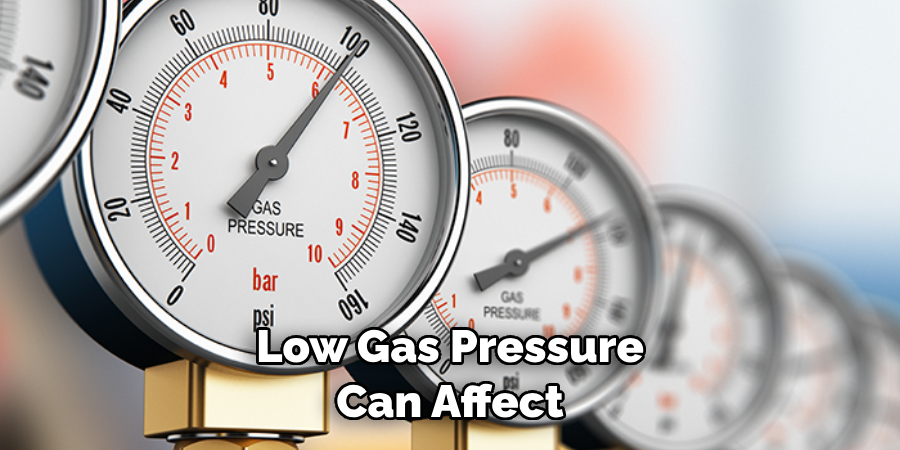
4) Test the TPR Valve
The temperature and pressure release (TPR) valve is a safety feature that releases excess pressure in the tank. Test the valve periodically to ensure it is functioning properly and replace it if necessary. Just be sure to follow proper safety precautions when testing the TPR valve.
5) Insulate Hot Water Pipes
Insulating hot water pipes can help prevent heat loss and improve the efficiency of your hot water heater. This can also save you money on energy costs in the long run. Keep in mind, however, that insulation should only be added to hot water pipes, not cold ones.
6) Consider a Timer or Tankless System
If your hot water heater is consistently running out of hot water or you are looking to save energy, consider installing a timer or upgrading to a tankless system. A timer can help regulate usage and save money on utility bills, while a tankless system provides hot water on demand.
7) Check for Sediment Buildup
Over time, sediment and mineral buildup can accumulate in your hot water heater’s tank, affecting its efficiency. Regularly flushing the tank can help remove this buildup and maintain optimal functioning.
8) Read the Manufacturer’s Manual
When troubleshooting your hot water heater, always refer to the manufacturer’s manual for specific instructions and safety precautions. This will ensure that you are following the correct guidelines and using the right tools for your particular hot water heater model.
By keeping these additional tips on how to troubleshoot gas hot water heater in mind, you can troubleshoot your gas hot water heater effectively and potentially prevent future issues. Remember to always prioritize safety and seek professional assistance if needed.
Frequently Asked Questions for Troubleshooting Gas Hot Water Heater
How Often Should I Flush My Hot Water Heater?
It is recommended that your hot water heater be flushed at least once a year to remove any sediment buildup and maintain its efficiency. However, if you notice any signs of sediment or decreased hot water supply, it may be necessary to flush it more frequently.
Can I Replace the Parts on My Hot Water Heater Myself?
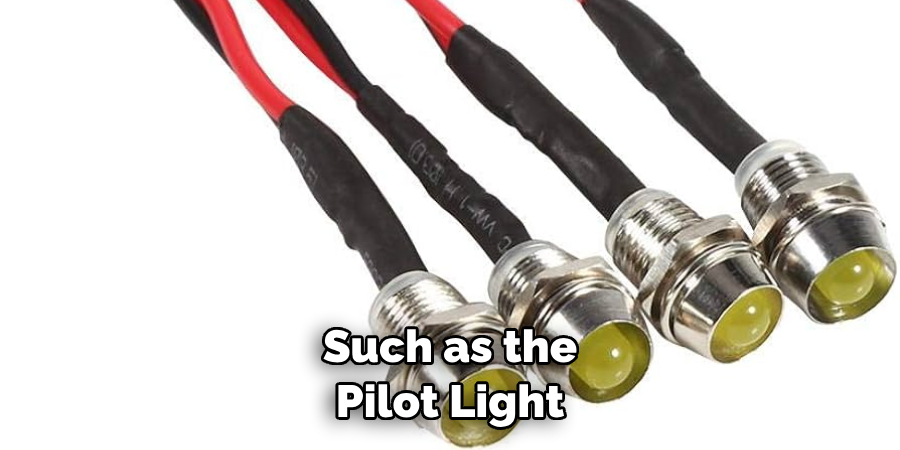
Some parts of a hot water heater can be replaced by the homeowner, such as the pilot light or thermocouple. However, other repairs and replacements require technical expertise and should be done by a professional for safety reasons.
How Long Should My Hot Water Heater Last?
The average lifespan of a hot water heater is typically around 8 to 12 years. Regular maintenance and proper usage can help prolong its lifespan, but eventually it will need to be replaced.
What Should I Do if I Smell Gas Around My Hot Water Heater?
If you smell gas around your hot water heater, immediately turn off the gas supply and ventilation to the appliance. Evacuate the area and call a professional for assistance.
Why is My Hot Water Heater Making Strange Noises?
Strange noises coming from your hot water heater can indicate an issue with sediment buildup or other mechanical issues. It is best to have a professional inspect the unit to determine the cause of the noises and address any necessary repairs. Remember to always prioritize safety and seek professional assistance if needed.
By keeping these FAQs in mind, you can troubleshoot your hot water heater effectively and potentially prevent future issues. Remember to always prioritize safety and seek professional assistance when needed.
Conclusion
Your hot water heater is an essential appliance that provides hot water for your daily needs. You can ensure its safe and reliable operation by avoiding common mistakes and following proper maintenance and troubleshooting techniques. Remember to regularly check the pilot light, thermostat settings, and gas supply, as well as schedule annual professional inspections.
With these tips in mind, you can effectively troubleshoot your gas hot water heater and enjoy hot water for years to come. Remember to always prioritize safety and seek professional assistance if needed.
With proper care and maintenance, your hot water heater can continue to provide hot water for your household for years to come without any major issues. Keep these tips on how to troubleshoot gas hot water heater in mind, and happy troubleshooting! Lastly, remember to always prioritize safety and seek professional assistance if needed.

